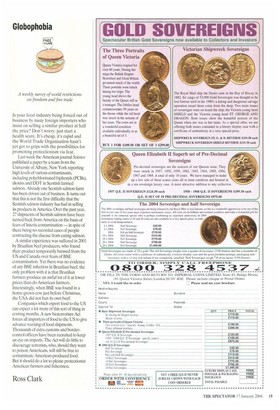Is your food industry being forced out of business by
nasty foreign importers who insist on selling a similar product at half the price? Don't worry: just start a health scare. It's cheap, it's rapid and the World Trade Organisation hasn't yet got to grips with the possibilities for promoting protectionism via fear.
last week the American journal Science published a paper by a team from the University of Albany, New York reporting high levels of various contaminants, including polychlorinated biphenyls (PCBs), dioxins and DDT in Scottish farmed salmon. Already one Scottish salmon farm has been driven out of business. It turns out that this is not the first difficulty that the Scottish salmon industry has had in selling its products in America. Over the past year, 27 shipments of Scottish salmon have been turned back from America on the basis of fears of listeria contamination in spite of there being no recorded cases of people contracting the disease from eating salmon. A similar experience was suffered in 2001 by Brazilian beef producers, who found their product temporarily banned from the US and Canada over fears of BSE contamination. Yet there was no evidence of any BSE infection in Brazilian beef; the only problem with it is that Brazilian farmers produce an awful lot of it at lower prices than do American farmers. Interestingly, when BSE was found in a home-grown cow just before Christmas, the USA did not ban its own beef.
Companies which export food to the US can expect a lot more of this sort of thing in coming months. A new bioterrorism Act forces all importers of food to the US to give advance warning of food shipments. Thousands of extra customs and bordercontrol officers have been recruited to keep an eye on imports. The Act will do little to discourage terrorists, who, should they want to poison Americans, will still be free to contaminate American-produced food. But it should do a lot to please protectionist American farmers and fishermen.
Ross Clark


































































 Previous page
Previous page